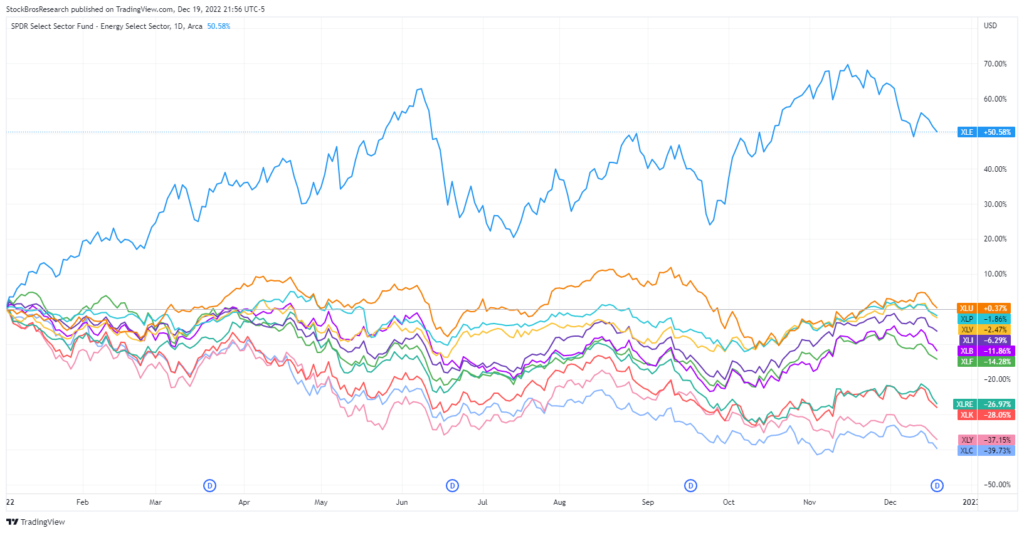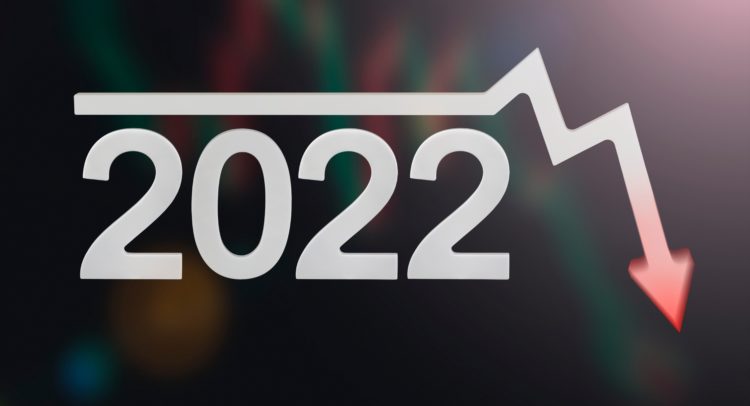We’re not far away from 2023 – a year that investors are hoping will bring greater fortunes than 2022, and for a good reason. This past year has been quite shaky. Macroeconomic uncertainty, geopolitical instability, and a hawkish FED have so far driven the S&P 500 (SPX) 17% lower year-to-date. The best-performing sector has been energy, which is up roughly 50%, partially offsetting the massive losses recorded in other areas. In fact, excluding some small gains made in utilities, almost every other sector has been more or less deep in the red this year. With that said, let’s do a quick sector recap, ranked from the best-performing to the worst-performing one.

Energy (XLE): Up 50.6%
Energy has been by far the best-performing sector of the S&P 500 in 2022. With geopolitical instability raging, the energy market transformed significantly during this period. Specifically, following the West’s sanctions on Russian energy, a domino effect unfolded, resulting in energy shortages and existing energy transportation routes crumbling. The result? Oil, gas, and coal prices skyrocketed! Oil majors and companies in the space, in general, have been posting monster profits.
While commodity prices have somewhat eased, they remain quite elevated, so it wouldn’t be unlikely for energy to perform well in 2023 as well. Alliance Resource Partners (NYSE: ARLP) was one of the best performers among energy stocks. Read: After Massive 722% Rally, is Alliance Resource Stock a Buy?
Utilities (XLU): Up 0.4%
The utilities sector comprises a branch of boring but steady compounders. Households and businesses have continued to pay their electric and water bill, and utilities have continued paying out their stable and slowly but gradually-growing dividends – nothing surprising here. If you are looking to park your cash somewhere for relatively low-volatility returns, this was, is, and likely will continue to be the place – at least in the foreseeable future. Read: ONE Gas (NYSE: OGS): The Ultimate Dividend-Growth Stock for Minimal Volatility
Consumer Staples (XLP): Down 1.9%
The consumer staples sector performed quite resiliently this year. On the one hand, that is not shocking, considering that companies in the space provide everyday necessities whose sales are mostly uncorrelated to the state of the underlying economy. For this reason, companies in the space also managed to pass inflationary costs through to consumers relatively easily too.
On the other hand, what is somewhat shocking is that valuations in the sector have remained quite lofty. Sure, it makes sense that investors are paying a premium for companies that enjoy relatively predictable cash flows in an unpredictable environment, but paying 25x earnings for Coca-Cola (NYSE: KO) or PepsiCo (NASDAQ: PEP) is still hard to justify, in my view.
Healthcare (XLV): Down 2.5%
Healthcare stocks are doing somewhat well, considering the underlying market environment. Hospitals kept ordering medical devices, and pharma majors continued to post record sales and profits. Nothing to see here in terms of highlights, really. The sector is full of high-quality mega caps that enjoy reliable and recurring cash flows. I would expect stable performance moving into 2023 as well, excluding any valuation headwinds.
Industrials (XLI): Down 6.3%
Industrials were pushed by two major forces. Higher costs amid a highly-inflationary environment were offset by major gains in the aerospace & defense space. While most non-defense companies were impacted by compressed profit margins, the sector was rescued by defense behemoths enjoying massive tailwinds due to the ongoing war in Ukraine.
I recently analyzed 2 Top Defense Stocks with Growing Dividends for 2023 if you are looking for some dividend ideas. Alternatively, Why Lockheed Martin’s (NYSE: LMT) Giant Backlog Can Keep Growing should be worth a read for deeper dive into one of the sector’s best performers lately.
Basic Materials (XLB): Down 11.9%
Basic materials declined, on average, following commodity prices normalizing from last year’s extreme highs. Supply-chain issues in 2021 resulted in fantastic supply/demand for chemical providers and for miners of all sorts of minerals. In 2022, the market mostly came to its senses, resulting in mild losses for basic materials stocks.
Financials (XLF): Down 14.3%
Financials were negatively impacted by rising interest rates and lower assets under management. While banks have benefited from juicer net interest spreads, borrowing costs have affected the sector negatively, in general. BDCs (Business Development Companies) have fewer lending opportunities, personal and commercial loan volumes have plummeted, and asset management firms have seen their AUM fall amid softer asset prices. With the FED remaining hawkish, financials may continue to be under pressure moving into 2023.
Real Estate (XLRE): Down 27%
Real estate had a rough 2022. With interest rates on the rise, REITs now face higher borrowing costs and, thus, lower profit margins/leasing spreads. However, most real estate asset classes face challenges on their own as well. Residential real estate is cooling off after last year’s home-buying frenzy, commercial real estate remains bland, as hybrid working conditions have limited demand for office space, and retail locations still record soft foot traffic levels.
Some specialty asset classes remain rock solid, including cell tower REITs, but precisely for that reason, such stocks appear rather overvalued. If you want to dive deeper into this, read: Is SBA Communications Stock (NASDAQ:SBAC) Overvalued Despite Impeccable Fundamentals?
Technology (XLK): Down 28.1%
Technology dominated the stock market over the past decade, with the sector’s peak point being during the COVID-19 pandemic, amid the critical role companies in the space had in our everyday lives. That said, most tech stocks had grown overvalued last year. Combined with the shaky macroeconomic landscape reducing future growth expectations and rising interest rates compressing valuations, the tech sector had a stormy time in 2022.
Still, some tech companies benefit from the current inflationary environment. Read: How Inflation Will Power Visa & Mastercard’s Earnings Higher.
Consumer Discretionaries (XLY): Down 37.2%
Consumer Discretionaries was the second worst-performing sector in 2022, losing over 1/3 of its value. While consumer spending has remained relatively strong, inflationary forces have squeezed profit margins in the sector. Investors are also essentially betting that companies in the space will underperform if we undergo a prolonged recession. Consumer discretionaries remains one of the riskiest sectors as we enter 2023 for this reason as well. Amazon (NASDAQ: AMZN), the sector’s largest constituent, is now trading near three-year lows. Read: Is Amazon Stock (NASDAQ:AMZN) Worth Buying Near 3-Year Lows?
Communications (XLC): Down 39.7%
Communications suffered dramatically during 2022. Declining global advertising spending has hurt companies like Alphabet (NASDAQ: GOOGL) (NASDAQ: GOOG) and Meta Platforms (NASDAQ: META), while rising interest rates made the yields from telecom giants such as AT&T (NYSE: T) and Verizon (NYSE: VZ) less attractive, resulting in violent corrections. That said, valuations in the sector have now descended to quite alluring levels. Communication stocks are likely to rebound considerably in 2023 if the macro environment shifts toward the better, even by a slight margin.
Takeaway
This past year has been such a roller coaster. If it weren’t for energy’s massive gains, the S&P 500 would have cratered this year. Will 2023 treat us better? Well, it remains to be seen as uncertainty prevails. Hopefully, the Fed will achieve its goals toward a “soft landing,” resulting in equities regaining at least some of 2022’s lost ground. Still, be wary of dead cat bounces, including a potential Santa Claus rally toward the end of the year, as there could be more pain ahead. Happy investing!

